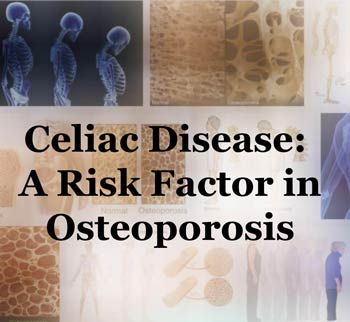Secondary Osteoporosis Caused by Risk Factors like Celiac Disease
March 6, 2014 by Amy Leger | G+ Amy Leger When we think of osteoporosis you may only picture that “little old lady” who can no longer stand up straight — wondering if that will ever be you… or me. That thought has crossed my mind before. But the reality is, according to the National Osteoporosis Foundation, 52 million Americans either have osteoporosis or low bone mass which can eventually lead to osteoporosis.
When we think of osteoporosis you may only picture that “little old lady” who can no longer stand up straight — wondering if that will ever be you… or me. That thought has crossed my mind before. But the reality is, according to the National Osteoporosis Foundation, 52 million Americans either have osteoporosis or low bone mass which can eventually lead to osteoporosis.
Primary osteoporosis is like what I described above. It happens to women after menopause when they lose estrogen. For men it is more related to age, and happens beginning in their 70s.
The Wall Street Journal reported this week increased concern about secondary osteoporosis. This is when certain factors contribute to bone loss and at a younger age.
Celiac & its connection to osteoporosis
The article specifically cites celiac disease in potentially causing secondary osteoporosis. Celiac disease is an autoimmune disorder. When gluten is consumed by a person with celiac they have autoimmune reaction in their gut. The villi is wiped out in the small intestine which is then unable to absorb essential nutrients from our food…like vitamin D and calcium. If you continue to go undiagnosed, you can take all the vitamin supplements you want and the likely won’t be absorbed to do any good. The only treatment is a gluten free diet, which repairs the gut and allows it to absorb nutrients again.
A 2005 study actually recommended all osteoporosis patients get the blood test for celiac. The research, conducted by the Washington University School of Medicine, found the rate of people who had osteoporosis who also had undiagnosed celiac disease was 4.5%. Lead researcher William F. Stenson, M.D. said back then, “The idea is that if a patient has osteoporosis as a consequence of celiac disease, the most direct way to correct their bone loss would be to put them on a gluten-free diet.”
Other risk factors of secondary osteoporosis
Besides celiac disease, the Wall Street Journal article also mentioned other issues that can put you at risk for secondary osteoporosis:
- Cancer
- Rheumatoid Arthritis
- Inflammatory Bowel Disease
- Reflux medicine, blood thinners and some anti-depressants
- Bariatric surgery patients
- Breast or prostate cancer patients receiving hormonal treatments
You can always get a bone density test to check whether you may have bone loss.
To promote good bone health, the National Institutes for Health Osteoporosis and Related Bone Diseases National Resource Center says we should be getting enough calcium and vitamin D, perform weight bearing exercise, not smoke cigarettes or drink excessive amounts of alcohol. If you still have issues, medication may be prescribed.
*I am not a medical professional. Please consult with your clinician if you have additional questions
Tags: celiac, gluten-free, osteoporosis, primary, secondary



Leave a Reply